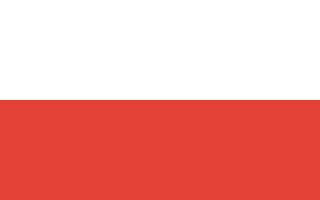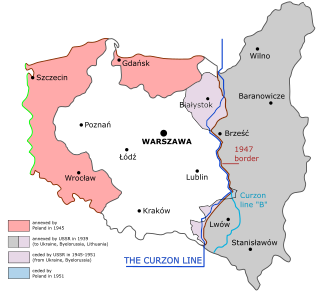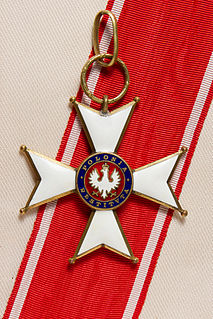
The Second Polish Republic, at the time officially known as the Republic of Poland, was a country in Central and Eastern Europe that existed between 1918 and 1939. The state was established in 1918, in the aftermath of World War I. The Second Republic ceased to exist in 1939, when Poland was invaded by Nazi Germany, the Soviet Union and the Slovak Republic, marking the beginning of the European theatre of World War II.
Poland is a country in Central Europe.

The Polish People's Republic was a country in Central Europe that existed from 1947 to 1989 as the predecessor of the modern Republic of Poland. With a population of approximately 37.9 million near the end of its existence, it was the second most-populous communist and Eastern Bloc country in Europe. Having a unitary Marxist–Leninist government, it was also one of the main signatories of the Warsaw Pact alliance. The largest city and official capital since 1947 was Warsaw, followed by the industrial city of Łódź and cultural city of Kraków. The country was bordered by the Baltic Sea to the north, the Soviet Union to the east, Czechoslovakia to the south, and East Germany to the west.

The Peace of Riga, also known as the Treaty of Riga, was signed in Riga on 18 March 1921, among Poland, Soviet Russia and Soviet Ukraine. The treaty ended the Polish–Soviet War.
This is a list of timelines of events over the period of World War II, as well as the prelude to the war.

The Polish government-in-exile, officially known as the Government of the Republic of Poland in exile, was the government in exile of Poland formed in the aftermath of the Invasion of Poland of September 1939, and the subsequent occupation of Poland by Germany and the Soviet Union, which brought to an end the Second Polish Republic.

At the end of World War II, Poland underwent major changes in its territorial extent. In 1945, after the defeat of Nazi Germany, the Oder–Neisse line became its western border, and the Curzon Line its eastern border, in accordance with the decisions made first by the Allies at the Tehran Conference of 1943 where the Soviet Union demanded the recognition of the line proposed by British Foreign Secretary Lord Curzon in 1920.

The Polish diaspora comprises Poles and people of Polish heritage or origin who live outside Poland. The Polish diaspora is also known in modern Polish as Polonia, the name for Poland in Latin and many Romance languages.
Battle of Lwów or Battle of Lemberg may refer to:

The Order of Polonia Restituta is a Polish state order established 4 February 1921. It is conferred on both military and civilians as well as on foreigners for outstanding achievements in the fields of education, science, sport, culture, art, economics, national defense, social work, civil service, or for furthering good relations between countries.

Rzeczpospolita is the official name of Poland and a traditional name for some of its predecessor states. It is a compound of rzecz "thing, matter" and pospolita "common", a calque of Latin res publica, i.e. republic, in English also rendered as commonwealth (historic) and republic (current).
The current Constitution of Poland was founded on 2 April 1997. Formally known as the Constitution of the Republic of Poland, it replaced the Small Constitution of 1992, the last amended version of the Constitution of the Polish People's Republic, known from December 1989 as the Constitution of the Republic of Poland. It was adopted by the National Assembly of Poland on 2 April 1997, approved by a national referendum on 25 May 1997, promulgated by the President of the Republic on 16 July 1997, and came into effect on 17 October 1997.
Sokol is a Pan-Slavic physical education movement, with origins in the Czech lands.
Treaty of Warsaw may refer to:
Flying University was an underground educational enterprise that operated from 1885 to 1905 in Warsaw, the historic Polish capital, then under the control of the Russian Empire, and that was revived between 1977 and 1981 in the communist People's Republic of Poland. The purpose of this and similar institutions was to provide Polish youth with an opportunity for an education within the framework of traditional Polish scholarship when that collided with the ideology of the governing authorities. In the 19th century, such underground institutions were important in the national effort to resist Germanization under Prussian and Russification under Russian occupation. In the People's Republic of Poland, the Flying University provided educational opportunities outside government censorship and control of education.

Ministry of National Defense is the office of government in Poland under the Minister of National Defense. It is responsible for the organization and management of the Polish Armed Forces. During the Second Polish Republic and World War II it was called the Ministry of Military Affairs. Ministry budget for 2019 was 45.4 billion PLN.
Polish culture during World War II was suppressed by the occupying powers of Nazi Germany and the Soviet Union, both of whom were hostile to Poland's people and cultural heritage. Policies aimed at cultural genocide resulted in the deaths of thousands of scholars and artists, and the theft and destruction of innumerable cultural artifacts. The "maltreatment of the Poles was one of many ways in which the Nazi and Soviet regimes had grown to resemble one another", wrote British historian Niall Ferguson.
Soviet Invasion can refer to:

Secret Teaching Organization was an underground Polish educational organization created in 1939 after the German invasion of Poland to provide underground education in occupied Poland during World War II.
Military of the Military may refer to:







